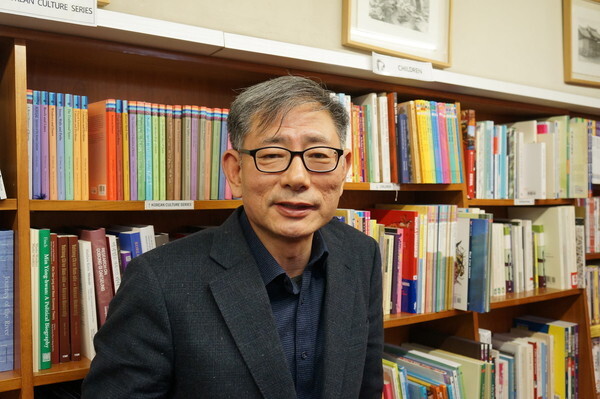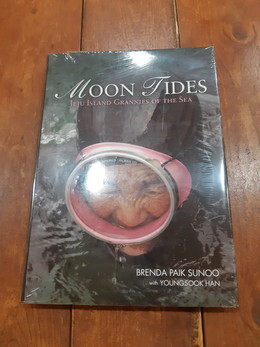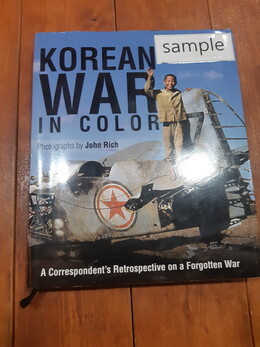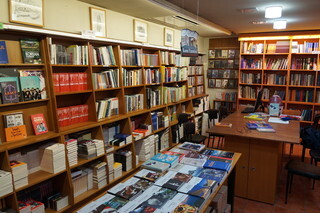hankyoreh
Links to other country sites 다른 나라 사이트 링크
[Interview] A passion for informing the world about Korea

Seoul Selection is a bookshop that caters to international readers, located in the basement level of the Korean Publishers Association building next to Seoul’s Gyeongbokgung Palace. The shelves in the store -- which celebrates its 18th year anniversary this month -- are stocked with 1,500 English-language books on Korea and Korean culture. The company has also been publishing its own books since 2003, the year after the store opened. To date, it has released around 130 Korea-related books in English and another 50 in Korean. It has published a 24-volume series on Korean film directors such as Bong Joon-ho, Im Kwon-taek, and Park Chan-wook; 10 years ago, it published South Korea’s first-ever collection of color photographs from the Korean War. This year, it is planning to publish an English translation of French resources on an 1866 punitive campaign conducted by France and Korea -- translated by Brother Anthony of Taize, a British-born translator of Korean literature who has become a naturalized South Korean citizen -- as well as a scholarly text on an 1871 US expedition in Korea written by Thomas Duvernay, a US-born professor of international studies at Yeungnam University. The Hankyoreh met with Seoul Selection CEO Kim Hyung-geun at the bookshop on Mar. 25.
The company currently has a total of 16 employees. In addition to its bookshop and publishing services, it also provides paid translation and outsourced publication services. At the moment, it is working on a newsletter for the Korea Foundation and a bulletin for the Federation of Korean Culture Center. For 15 years from 2003 to 2018, the company also published “Seoul,” an English-language monthly.
Always financially on the brink
“Financially, we’re always on the brink,” Kim said. “We have five times as many books in the shop as we did when we first opened, but our customers have decreased to a third. We had an average of 10 to 20 people visiting the shop each day [before the novel coronavirus outbreak], about half of whom bought books. We’re surviving through our earnings from translation and selling books to US universities and elsewhere.”
As of late 2019, South Korea was home to around 2 million international residents -- three times as many as when the store was opened. So why have visits to the bookshop fallen?
“The stature of books as a means of satisfying the desire for culture has fallen markedly,” Kim said. “Visual media like YouTube have had a big influence. You see a tremendous outpouring of video content on Koreans’ lifestyles and culture, with things like jjimjilbang [public bathhouses], mukbang [eating shows], and fashion. It’s basically the same thing as having a whole bunch of new TV channels informing people about Korea.”
Kim also shared another factor in the bookshop’s struggles.
“As the trend of international residents staying in Korea for the long term has intensified, foreigners are becoming more and more like Koreans. And one of the biggest characteristics of ‘becoming more like Koreans’ is that you spend less time reading books,” he said.
“Koreans depend a lot on human relationships. International residents have picked up that if you fail at human relationships in Korea, you’re going to fail at everything else.”
While books sharing South Korea’s distinctive regional qualities sold well early in the bookshop’s history, the ones that sell these days approach South Korea from a more universal perspective, Kim said.
Shallow-interest books don’t sell well anymore
“The books with a shallow interest in Korea and Korean culture don’t really sell these days,” he explained. “Korea is already well-known. Early on, books on Korean film and traditional culture such as pottery and patterns sold well. Then there was a period where books that compared Korea with other countries were popular. Nowadays, the ones that sell are books about K-Pop groups like BTS, fiction by Han Kang, and language books for Korean study. In the case of more academic Korean studies work, the demand has always been at a fixed level.”
Prior to opening the bookshop, Kim worked for 14 years as a reporter at Yonhap News.
Prior to that, Kim spent time as a high school English teacher and a reporter for an English-language magazine. What inspired Kim to leave the press for the culture industry? After seven years as a reporter on the local desk, he said, he got an opportunity to study in the US.
The link between peace and culture“I spent 1995 studying at American University in Washington, DC, where I happened to meet David Kim, secretary-general of the Korea Society [and son of the late writer Richard Eun Kook Kim]. David asked me if I was aware that CNN had installed satellite broadcasting equipment on the roof of Seoul’s foreign press center when nuclear war almost broke out in Korea the previous year. That took me by surprise. From an early age, I’d felt strongly that there must never be a war on the Korean Peninsula. That’s how this all started.”
So what’s the link between peace and the culture industry? “I thought that, if people learned that Korea is a good place to live, foreign investment would increase, which would make war less likely.”
When asked if Korea has become better known over the past 18 years, Kim offered the following reflections: “When I started my bookstore, foreigners didn’t even know that Seoul had large performance halls like the Sejong Center. Even back then, there were 10 large concert halls within an hour’s reach of Seoul. That’s why I worked so hard to create a newsletter at the bookstore, to raise awareness about art exhibitions and concerts in the city.”
The publication that Kim remembers the most fondly is his company’s eponymous travel guide to Seoul, released in 2009. “For four years, starting in 2010, ‘Seoul’ outsold Lonely Planet’s Seoul guide on Amazon. I thought that was such a big deal for the publishing industry that I even had a press release drafted and distributed to the newspapers,” he recalls.

Kim’s also proud of “Trampled Blossoms,” a Korean-language novel, published in 2016, that takes the comfort women as its theme. Kim personally recruited the novelist for young adults Moon Young-sook to write the book. An English-language translation of the book was released by Seoul Selection last year.
“A lot of the Koreans I met on business trips to the US would tell me that they wished there were a book about the comfort woman to serve as an alternative to ‘So Far from the Bamboo Grove,’” Kim said. Written by a Japanese-American, ‘So Far from the Bamboo Grove’ is a novel written from the perspective of a Japanese boy whose family is struggling to return to Japan from its Korean colony after the Japanese Empire’s defeat in World War II. The Korean-language edition of “Trampled Blossoms” has sold nearly 10,000 copies.
Kim wants his bookstore to function as a library for research about Korea. That’s why he tries to keep in stock all the English-language books about Korea that are released in the country.
When asked about the sales of Seoul Selection’s English-language books, Kim admits they don’t sell much at all. “We end up with so many books left in stock that we’ve donated them to a number of public libraries. Even now we spend 2 million won [US$1,630] a month just in storage costs,” he said.
Plans for new content and more books in KoreanWhat about his future plans? “It won’t be easy, but I’d like to put even more energy into publishing,” Kim said. “I’d like to take a broader view of Korea and create completely new content. I’d also like to release more books in the Korean language,” he said.
Kim wanted to stress one point in particular. “Koreans have an innate desire to raise awareness about their country. That derives from the older generation’s bitter memories of being ruled by the Japanese during the colonial occupation. When I first opened my bookstore, a Korean literary translator I’d never met before was so thrilled with the idea that he invested a large sum of money. There are two other people like that. I’ve also had the backing and encouragement of foreigners who love Korea. For several years, English teachers from South Africa would hold monthly meetings in the bookstore. It’s thanks to people like that we’ve stayed open for so long. We’ll need their passion in the future, too.”
By Kang Sung-man, senior staff writer
Please direct comments or questions to [english@hani.co.kr]

Editorial・opinion
![[Column] Season 2 of special prosecutor probe may be coming to Korea soon [Column] Season 2 of special prosecutor probe may be coming to Korea soon](https://flexible.img.hani.co.kr/flexible/normal/500/300/imgdb/original/2024/0426/3317141030699447.jpg) [Column] Season 2 of special prosecutor probe may be coming to Korea soon
[Column] Season 2 of special prosecutor probe may be coming to Korea soon![[Column] Park Geun-hye déjà vu in Yoon Suk-yeol [Column] Park Geun-hye déjà vu in Yoon Suk-yeol](https://flexible.img.hani.co.kr/flexible/normal/500/300/imgdb/original/2024/0424/651713945113788.jpg) [Column] Park Geun-hye déjà vu in Yoon Suk-yeol
[Column] Park Geun-hye déjà vu in Yoon Suk-yeol- [Editorial] New weight of N. Korea’s nuclear threats makes dialogue all the more urgent
- [Guest essay] The real reason Korea’s new right wants to dub Rhee a founding father
- [Column] ‘Choson’: Is it time we start referring to N. Korea in its own terms?
- [Editorial] Japan’s rewriting of history with Korea has gone too far
- [Column] The president’s questionable capacity for dialogue
- [Column] Are chaebol firms just pizza pies for families to divvy up as they please?
- [Column] Has Korea, too, crossed the Rubicon on China?
- [Correspondent’s column] In Japan’s alliance with US, echoes of its past alliances with UK
Most viewed articles
- 1Why Kim Jong-un is scrapping the term ‘Day of the Sun’ and toning down fanfare for predecessors
- 2‘We must say no’: Seoul defense chief on Korean, USFK involvement in hypothetical Taiwan crisis
- 3After election rout, Yoon’s left with 3 choices for dealing with the opposition
- 4Two factors that’ll decide if Korea’s economy keeps on its upward trend
- 5BTS says it wants to continue to “speak out against anti-Asian hate”
- 6AI is catching up with humans at a ‘shocking’ rate
- 7Noting shared ‘values,’ Korea hints at passport-free travel with Japan
- 846% of cases of violence against women in Korea perpetrated by intimate partner, study finds
- 9Why Korea shouldn’t welcome Japan’s newly beefed up defense cooperation with US
- 10Ethnic Koreans in Japan's Utoro village wait for Seoul's help